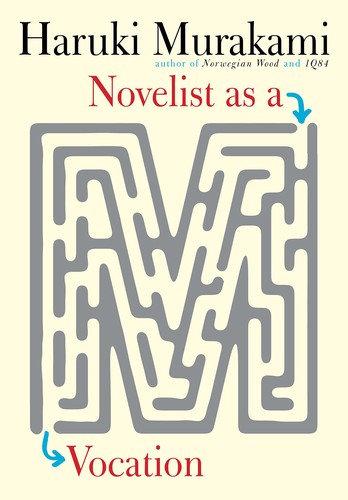Woordenaar reviewed Romanschrijver van beroep by Haruki Murakami
Murakami graaft zich autobio
4 stars
Elf essays over zijn schrijverschap, geschreven met veel vaart en humor. Wat rest is het verlangen al die romans die ik al eerder las te herlezen.

English language
Published Feb. 5, 2022 by Knopf Doubleday Publishing Group.
A unique look at the craft of writing from a bestelling master of storytelling.
In this engaging book, the internationally best-selling author shares with readers what he thinks about being a novelist; his thoughts on the role of the novel in our society; his own origins as a writer; and his musings on the sparks of creativity that inspire other writers, artists, and musicians.
Readers who have long wondered where the mysterious novelist gets his ideas and what inspires his strangely surreal worlds will be fascinated by this highly personal look at the craft of writing.
Elf essays over zijn schrijverschap, geschreven met veel vaart en humor. Wat rest is het verlangen al die romans die ik al eerder las te herlezen.
Novelist As A Vocation is an overlapping series of eleven essays, originally written by Murakami just as an exercise for himself, but which have now been overhauled and published in this collection. I suppose I should admit here than, when offered the book, I didn't think I had actually read anything else by Murakami. As it turned out I was reminded that I had read his running memoir several years ago (before I started reviewing everything I read), but I am yet to pick up a Murakami novel. That said, I am fascinated by the myriad ways in which writers ply their craft so I was still curious about Murakami's insights.
As he repeatedly tells readers, he has been a novelist for thirty-five years (at the time of the Japanese publication), yet his experience seemed somewhat atypical from what I had expected. He has interesting ideas about the characters …
Novelist As A Vocation is an overlapping series of eleven essays, originally written by Murakami just as an exercise for himself, but which have now been overhauled and published in this collection. I suppose I should admit here than, when offered the book, I didn't think I had actually read anything else by Murakami. As it turned out I was reminded that I had read his running memoir several years ago (before I started reviewing everything I read), but I am yet to pick up a Murakami novel. That said, I am fascinated by the myriad ways in which writers ply their craft so I was still curious about Murakami's insights.
As he repeatedly tells readers, he has been a novelist for thirty-five years (at the time of the Japanese publication), yet his experience seemed somewhat atypical from what I had expected. He has interesting ideas about the characters and personalities of novelists in general - never bother inviting two of them to the same dinner party - and also addresses concepts including literary prizes and how 'what constitutes literature' is determined. For me, the most intriguing essay was one in which Murakami discusses developing his style by writing his initial drafts in the foreign language of English which, at the time, he did not speak particularly well, then translating them into Japanese. He felt utilising a second language opened up his creativity in a way that Japanese could not. I am encouraged to try this approach out for myself!
Overall, I thought that Novelist As A Vocation would, as is perhaps to be expected, appeal most to dedicated Murakami fans. He does frequently invoke his various novels to illustrate the points he makes so already knowing them would have been beneficial! Aside from his writing though, Murakami has led an unusual life and I appreciated this opportunity to learn more about this generally private writer.


